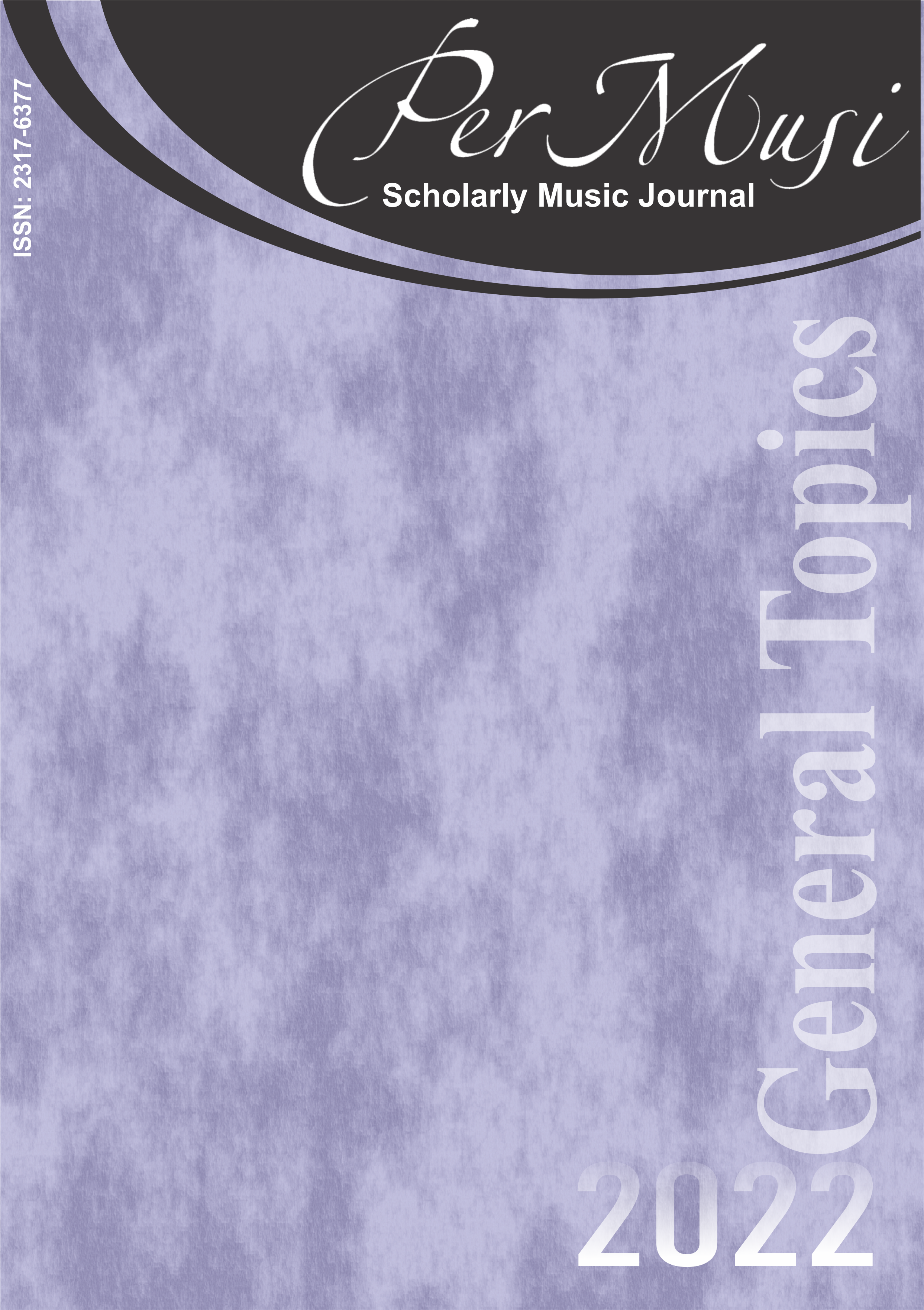Nacionalismo Folclórico e Nacionalismo Essencial em Loanda e Maracatu de José Siqueira
Elementos do Maracatu e sugestões para interpretação
DOI:
https://doi.org/10.35699/2317-6377.2022.38325Palavras-chave:
José Siqueira, Canção de Câmara Brasileira, Oito Canções Populares Brasileiras, Loanda, MaracatuResumo
Este artigo descreve como o compositor brasileiro José Siqueira (1907-1985) utilizou elementos da tradição folclórica conhecida como Maracatu na composição das canções intituladas Loanda e Maracatu. O objetivo secundário é sugerir abordagens interpretativas que levem em consideração os aspectos musicais, textuais e socioculturais destas canções. A metodologia utilizada para as análises foi baseada nas categorias e termos para análise de canções de câmara descritos por Carol Kimball em seus dois livros sobre canção de câmara, assim como no Sistema Trimodal desenvolvido por Siqueira. Em Loanda e Maracatu, Siqueira usa várias células rítmicas típicas do Maracatu, assim como uma linguagem musical claramente pertencente ao século XX, confirmando as duas orientações estéticas do compositor: Nacionalismo Folclórico (quando o compositor usa os elementos puros do folclore) e Nacionalismo Essencial (quando o compositor se inspira no folclore para criar sua própria linguagem musical).
Referências
Barreto, Almir Cortes. 2012. “Improvisando em Música Popular: Um estudo sobre o choro, o frevo e o baião e sua relação com a ‘música instrumental’ brasileira.” Doctoral dissertation, Campinas, SP: Universidade Estadual de Campinas, Campinas.
Guerra-Peixe, César. 1955. Maracatus do Recife. São Paulo, SP: Ricordi.
Kimball, Carol. 2005. Song: A Guide to Art Song Style and Literature. Milwaukee, WI: Hal Leonard.
Kimball, Carol. 2013. Art Song: Linking Poetry and Music. Milwaukee, WI: Hal Leonard.
Moraes, Edelson da S., and Eduardo de L. Visconti. 2015. “Um Estudo Musical do Maracatu Rural sob a Ótica dos Instrumentistas Participantes.” CONIC 23, 1-4, Recife, PE. Anais... Recife, PE: Universidade Federal de Pernambuco. https://www.ufpe.br/documents/616030/893087/Um_estudo_musical_do_maracatu.pdf/e8b92bab-a891-4046-859a-cc9f6434b5f1. Accessed 25 jan. 2022.
Pereira, Marco. 2007. Ritmos Brasileiros para Violão. Rio de Janeiro, RJ: Garbolights Produções Artísticas.
Queiroz, Luiz Kleber Lyra de. 2013. “A Ópera ‘A Compadecida’ de José Siqueira: Elementos Musicais Característicos do Nordeste Brasileiro e Subsídios para Interpretação.” Master’s thesis, João Pessoa, PB: Universidade Federal da Paraíba, João Pessoa.
Ramos, Joranaide Alves. 2013. “Ascenso Ferreira: Um Poeta-Cantador da Cultura Pernambucana.” Master’s thesis, Maceió, AL: Universidade Federal de Alagoas, Maceió.
Rechberger, Herman. 2008. Scales and Modes around the World. Finland: Fennica Gehrman.
Silva, Aynara Dilma Vieira. 2013. “Coerência Sintática do Sistema Trimodal em Duas Obras de José Siqueira.” Master’s thesis, João Pessoa, PB: Universidade Federal da Paraíba, João Pessoa.
Silva, Bruno Rejan. 2011. “Improvisação na Música Popular Brasileira Instrumental (MPBI): Aspectos da Performance do Contrabaixo Acústico.” Master’s thesis, Goiânia, GO: Universidade Federal de Goiás, Goiânia.
Siqueira, José. n/d. Oito Canções Populares Brasileiras. Rio de Janeiro, RJ: J. L. Siqueira, Rio de Janeiro.
Siqueira, José. 1981. O Sistema Modal na Música Folclórica do Brasil. João Pessoa, PB..
Tavares, Hekel. 1946. Maracatus. São Paulo, SP: Irmãos Vitale, São Paulo.
Villela, Márcia. “Sinfonia para os 70 anos do maestro José Siqueira.” O Globo, Rio de Janeiro, RJ, June 25, 1977, Matutina, Cultura, p. 35. https://acervo.oglobo.globo.com/consulta-ao-acervo/?navegacaoPorData=197019770625. Acessed January 25, 2022.
Downloads
Publicado
Edição
Seção
Licença
Copyright (c) 2022 Per Musi

Este trabalho está licenciado sob uma licença Creative Commons Attribution 4.0 International License.

Exceto onde está indicado, o conteúdo neste site está sob uma Licença Creative Commons - Atribuição 4.0 Internacional.












